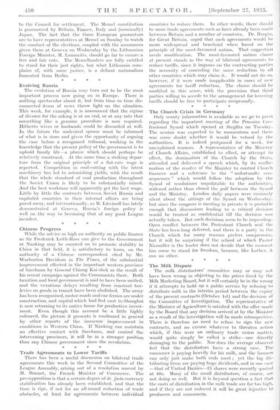'Trade Agreements to Lower Tariffs There has been a useful
discussion on bilateral trade agreements this week in the Second Committee of the League Assembly, arising out of a resolution moved by M. Bonnet, the French Minister of Commerce. The presupposition is that a certain degree of de facto currency stabilisation has already been established, and that the time is ripe, if not for an all-round reduction of trade obstacles, at least for agreements between' individual countries to reduce them. In other words, there should be more trade agreements such as have already been made between Britain and a number of countries. Dr. Burgin, for Great Britain, urged that such agreements would be more widespread and beneficial when based on the principle of the most-favoured nation. That suggestion needs modification. The most-favoured nation clause at present stands in the way of bilateral agreements to reduce tariffs, since it imposes on the contracting parties the necessity of conceding the same reduction to all other countries which may claim it. It would not do so, however, if it were made inapplicable in cases of new agreements for tariff reduction. The clause should be modified in this sense, with the provision that third parties willing to accede to the arrangement for lowering tariffs should be free to participate reciprocally.














































 Previous page
Previous page